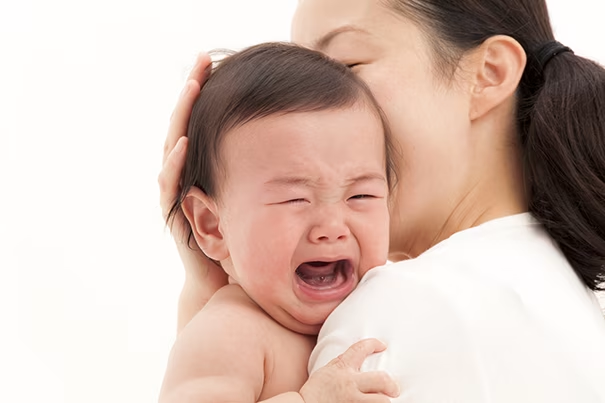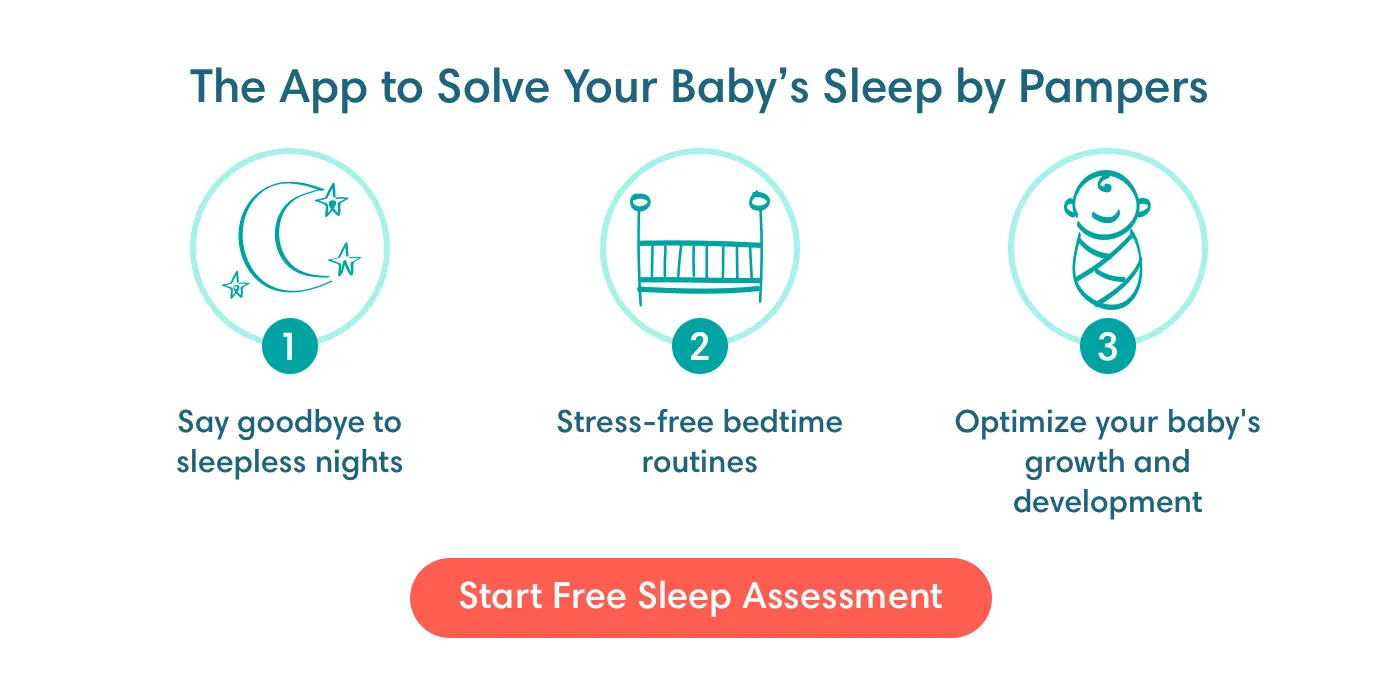- Newborn Baby
- Newborn Sleep
- How to Soothe Your Crying Baby

How to Soothe Your Crying Baby
In the first few months, crying is your infant’s only way of letting you know that he or she needs or wants something, but it can be distressing for you if you’re uncertain what it is, and how to stop your baby from crying. Read on to find out how to soothe your baby with our 10 easy methods and learn what to do if your baby won't stop crying.
Why Do Babies Cry?
Crying is the most important means of communication for your baby. It’s not always easy to figure out what’s wrong if your baby suddenly starts crying, but after a while you may start to recognise the different cries and other signs.
For example, your infant’s hungry cry may be completely different from a cry of distress. There are other clues as well – for example, smacking the lips or turning towards your breast could mean your baby wants a feed. Eventually you'll get better at picking up on your baby's signals and helping your baby stop crying by responding to those cues.
Here are some of the most common reasons why your baby may be crying:
Hunger. It might be time for a feed. Look out for feeding cues, opening the mouth, putting a hand to the mouth or turning the head from side to side. If your child is crying with hunger, use one of the baby soothing methods below to calm your baby down before starting to feed. Generally speaking, it’s better to feed your baby before it gets to the point where he or she is crying with hunger.
Being too cold or too hot. Your baby might be overdressed or underdressed. As a rule of thumb, during the day dress your infant in one or two more layers than what you are wearing yourself. At night, make sure your baby’s room is at a comfortable and safe temperature for sleeping (ideally between 16° and 20° Celsius.
Wet or soiled nappy. Your baby could be uncomfortable from being wet or soiled. Frequent nappy changes can keep that little bottom comfy and reduce the risk of nappy rash.
Tiredness. Your baby is using a lot of energy just to grow. If you notice your child also yawning or rubbing his or her eyes, it might just be time for a nap. Always put your baby to bed on his or her back and follow safe sleeping guidelines.
Needing a cuddle. Just like you, sometimes your baby may just need a little love and attention. A cuddle might do both of you a world of good!
Trapped wind. Sometimes when feeding, your baby can swallow bubbles of air that get trapped in his or her tummy. These can be a source of discomfort or pain. Winding (burping) your baby more frequently during or after feeding can help get those troublesome bubbles out of his or her system.
Boredom. A little distraction or play might be enough to cheer your baby up sometimes.
Overstimulation. Too much rocking and singing at bedtime can sometimes keep your little one awake, for example. If this happens, try a different technique such as putting your baby to bed immediately after a feed. If you suspect that overstimulation may be causing the crying, then dimming the lights and quietening things down a bit could help.
In Summary
Your baby is usually trying to tell you something by crying. If you can figure out what’s upsetting your child or what he or she needs – for example a feed, a fresh nappy, a little entertainment or just a cuddle – you’re already halfway to calming your crying baby.
10 Ways to Soothe Your Crying Baby
It's best to respond to your baby's cries as soon as you can in the first few months. Being close to you is what helps make your little one feel secure and loved.
Don't think of this as spoiling your child – it isn’t. Answering the cries promptly can get your baby to stop crying sooner and may help your child cry less in the long run.
If you know why your baby is crying – for example, it’s time for a feed or nappy change –then it's easier to remedy the crying. Sometimes, though, you may need to try a few different things to soothe and console your baby if he or she won't stop crying.
Try these 10 soothing methods to learn which ones work best to help your baby stop crying:
Hold your baby close. Being close to you is reassuring for your baby. Singing, talking and moving about gently – swaying or dancing – will help soothe your baby even more. Using a baby carrier or sling can allow you to keep your infant close while leaving your hands free when you need them.
Stroke your baby’s back. With your baby held against your chest or lying face-down on your lap, move your hand gently but firmly and rhythmically up and down your infant’s back.
Try a warm, soothing bath. Giving your baby a bath may calm your crying baby, although sometimes it may make the crying worse. If this method doesn’t work, move on to something else.
Massage. A gentle, relaxing baby massage can be a great way of soothing and bonding with your baby at the same time. A gentle tummy massage may also help relieve the discomfort of wind, colic or constipation. Ask your midwife or health visitor about baby massage classes in your area.
Rock your baby in a pushchair or pram. The movement of your baby’s pushchair and pram can have a relaxing effect. Just a backwards and forwards motion might work, or perhaps take your infant out for a walk or drive – especially if your baby is prone to getting sleepy thanks to the motion of the car or stroller. Keep in mind, for safety your baby should not be left to sleep in the car seat or stroller, instead move your baby to the crib as soon as possible.
Distract your baby. Try directing your baby’s attention to a mobile over the cot, a colourful rattle or some other toy. Pulling a funny face, playing peek-a-boo or trying some of these other fun baby games could turn those tears to giggles.
Put on some soothing music. Your baby may respond to soothing sounds. For example, your voice saying ‘there there...’, Music can have a similar effect. You might be able to buy or download specially created CDs or playlists of soothing baby music. Alternatively, just go through your own music collection to see what works. You might find that your baby prefers to listen to music that your listened to while you were pregnant.
Offer a breast. If you’re breastfeeding, your baby might find it soothing to have a little suckle at your breast.
Thumb-sucking or a dummy. Your baby might already have learned the trick of self-soothing by sucking a thumb or finger. If your baby has a dummy, offering it may also be an effective way of restoring balance to the universe. Keep in mind that experts advise using a dummy sparingly and weaning your child off it by the age of 10 to 12 months old. Though, it’s also OK for thumb-sucking to go on for longer (until the permanent teeth start to arrive) and it usually stops by itself around the age of 4 years old. If you’re unsure about what’s best ask your health visitor or dentist for personalised advice.
Swaddle your baby. Some parents find that swaddling helps calm and soothe their newborn baby. Swaddling is safe provided you follow the guidelines for safe swaddling. It’s important to leave room for your baby’s legs to move and kick. Stop swaddling when your baby shows signs of learning to roll over, which may happen as early as around 2 to 3 months old.
In Summary
Responding quickly to cries helps your child feel secure and loved. This in turn could help stop the crying sooner and make it easier for your baby to learn self-soothing in the long run. Other than responding to your baby’s specific needs, e.g., if he or she needs a feed, a nappy change or a nap, you may need to try several soothing techniques – from swaddling or a massage to playing your little one’s favourite music – before you find the one that works for your baby.
When Your Baby Won’t Stop Crying
Sometimes it might seem that your baby won’t stop crying whatever you do. If none of the usual techniques and tricks for soothing your baby don’t seem to work, there might be another reason for your baby’s crying. Some reasons why your baby might be crying more than usual:
Teething
The timeline for teething varies quite a bit, but usually after around 4 to 6 months old your baby’s teeth may start erupting. This can cause teething pain. To ease your baby's teething discomfort, try massaging sore gums with a clean finger or offer a chilled (but not frozen) teething ring to chew on.
Signs that your baby is teething can include:
Red, sore gums where the tooth is trying to push through
A flushed cheek on one side
Your baby rubbing his or her ear
More dribbling than usual
Gnawing and biting down on things
Grumpiness.
Fever
A high temperature or fever is your baby’s natural way of fighting infection like a cold or flu. If you suspect your baby may have a high temperature – for example, if your child’s back or chest feels hotter than usual – check it with a thermometer to confirm. An underarm reading of 38° Celsius or more is considered a fever. Call 111 or your child’s doctor straight away if your baby
is less than 3 months old with a fever of 38° Celsius or more
is 3 to 6 months old with a fever of 39° Celsius or more
has a high temperature that you can’t bring down
has a high temperature with other symptoms, like a rash
shows signs of dehydration, such as fewer or no wet nappies, or dry or sunken eyes.
Colic
If your baby is constantly crying for no apparent reason, it might be colic. The precise causes of colic are not fully understood, but it usually clears up by itself by the time your baby is around 6 months old. In the meantime, try winding your baby more frequently during feeds, and use whichever of the soothing methods above seems to work the best. See your child’s doctor if you’re concerned or the colic symptoms don’t seem to be easing up after 4 months of age. It might be colic if your baby does any of the following:
Cries more than three hours a day, three days a week for at least one week
Cries more often in the afternoon and evening
Is hard to soothe or calm down
Clenches fists and goes red in the face
Arches the back or adopts a foetal position (with knees pulled up to the stomach)
Has a rumbling tummy or lots of wind.
In Summary
If you’re finding it harder than usual to stop your baby from crying, there might be an underlying cause like teething, fever or colic. Ask your midwife, health visitor or doctor for advice if you’re worried or don’t know why your baby won’t stop crying.
Why Do Babies Sometimes Cry Around Feeding Time?
If your baby often cries or seems unsettled when feeding, the solution could be as simple as trying a different breastfeeding position. Your midwife or health visitor can help if you think you may still be having problems with attachment and positioning.
Here are some other possible causes of crying related to feeding:
Reflux
Your baby suddenly crying inconsolably during or after feeds might be a sign of reflux or gastro-oesophageal reflux disease (GORD). Reflux is when a little food or milk travels back up from your baby’s stomach. Sometimes a little stomach acid comes up as well, which can cause discomfort – and crying. You may be able to relieve the symptoms of reflux – and stop your baby from crying so often – by giving smaller but more frequent feeds, burping your baby regularly and holding him or her upright during and after feeds. Reflux usually gets better by itself as your baby’s digestive system matures – in most cases the symptoms clear up by around the age of 1. However, if the reflux is very frequent and/or painful it may be GORD. Ask your doctor or health visitor for advice if you think your baby might have GORD, especially if it’s causing problems with feeding or your child doesn’t seem to be putting on enough weight. Symptoms of reflux or GORD can include:
Frequently spitting up
Feeding difficulties – refusing feeds, gagging or choking
Grumpiness after feeds
Constant or sudden crying during and after feeds
Frequent hiccups or coughing
Poor weight gain
Frequent earaches
Waking up a lot during the night.
Food Allergy or Intolerance
Your baby constantly crying during or soon after feeds could be a sign of an allergy to cow’s milk or soya or an intolerance for lactose, all of which can make your baby uncomfortable. Talk to your midwife, health visitor or doctor if you suspect your baby may have a food allergy or intolerance. If you're breastfeeding, you may be advised to remove potential allergens such as dairy products from your diet. If your infant gets his or nourishment from formula and your baby is allergic to soya or milk, for example, your doctor may recommend that you switch to a hypoallergenic formula.
In Summary
If your baby cries a lot during or after feeds, it might be caused by reflux, gastro-oesophageal reflux disease (GORD), or a food intolerance or allergy. If simple steps like burping your baby more frequently and holding him or her upright for feeds don’t seem to help, talk to your midwife, health visitor or doctor.
When Your Baby Wakes up Crying
If your toddler or baby is crying in their sleep or waking up in tears regularly during the night for no obvious reason, you might like to try this simple sleep training technique to soothe your baby to sleep (if your baby is older than 6 months old):
Pick up and reassure your crying baby with some comforting words
When your baby stops crying, put them down while still awake
If your baby cries when you put them down again, pick them up and soothe again
Put your baby down and leave the room
Repeat these steps whenever your baby cries
Be patient – you may need to do this for a week or two before it starts to make a difference to your little one’s sleep pattern.
When your baby wakes up crying, consider using the Smart Sleep Coach by Pampers to help soothe them. This innovative product offers personalised sleep guidance, allowing you to understand your baby's sleep patterns and address potential sleep issues. With the Smart Sleep Coach app, reduce instances of your baby waking up crying and promote a peaceful sleep experience. Take the free sleep assessment and support a more restful night for both you and your baby.
Advice for Parents: How to Cope When Your Baby Cries
Sometimes, it can be really upsetting to hear your baby cry, especially when you aren’t sure what’s causing it and nothing seems to make it better. You also may already be a bit frazzled yourself, especially as babies often cry more in the evening when you’re likely to be more tired than usual. During these times it's important not to take your baby's cries personally. You haven’t done anything wrong and you’re not a bad parent. Remember, it's normal for babies to cry as a way to communicate their needs and even just to let off steam. Know, also, that some babies just cry more than others – sometimes it can be as simple as that. The good news is that crying usually peaks at around 7 months old and then tails off gradually.
Coping Strategies for Parents
If your baby won’t stop crying and you feel like you’re reaching the end of your tether, try some of these coping strategies:
Remember that some babies just cry more than others. Try not to be angry with yourself or your baby – remind yourself that the crying is normal for babies and it won’t last forever.
Put your baby in a safe place – like the cot or playpen – and take a little time out to calm down. Walk away and listen to some calming music, do some exercise or some household chores, read, draw or do whatever you find relaxing. Go back and check on your baby after a few minutes when you’re feeling a little calmer.
Call a friend or relative to ask for help or just a little sympathy and encouragement
Talk to your midwife or health visitor, who can suggest more personalised coping strategies and recommend support groups in your local area
Never shake your baby – this can cause permanent or even fatal brain injuries.
In Summary
Sometimes it can be hard to soothe your crying baby, and you may feel frustrated or even helpless at times. Try to keep in mind that all babies cry from time to time, the crying will stop eventually and it’s not your fault. If you need to, make sure your baby is safely in the cot or playpen and take a little time to calm down on your own. Never shake your baby, however frustrated you may be feeling.
FAQS AT A GLANCE
Ways to calm your crying baby include:
- Holding your baby close and swaying, dancing or singing
- Talking in a soft, soothing voice
- Gently stroking your baby’s back
- A warm, soothing bath
- Rocking your baby in a pushchair or pram
- Playing soothing music.
If your baby won’t stop crying there might be an underlying cause such as colic, teething or a fever. Ask your midwife, health visitor or doctor for advice if you’re worried or unsure why your little one won’t stop crying.
If you’re finding it hard to cope with your baby’s crying, put him or her down in the cot or playpen and take a few minutes to calm down. Ask for help if you need it. Never shake your baby.
It can be hard to tell why your baby is crying at first, but with time you’ll get better at recognising – and responding to – the different cries and other signals.
Common reasons for your baby’s crying include:
- Hunger
- Being too hot or cold
- Needing a change of nappy
- Tiredness
- Wind
- Reflux or gastro-oesophageal reflux disease (GORD)
- Fever
- Colic.
The Bottom Line
Figuring out what’s behind the crying is an important part of learning how to soothe your crying baby, and – even if it takes a little trial and error – you’ll get better at it and your child will get better at expressing needs and emotions in other ways, too. The next time your baby cries and you’re not sure why, stay calm and try some of the soothing methods listed in this article to see which one works the best. The crying spells will pass eventually, and as your little one grows and explores the world – with all its little ups and downs – you’ll have plenty of giggles and smiles to look forward to as well.
- NHS: Soothing a crying baby
- NHS: Baby feeding cues (signs)
- NHS: Your baby’s sleep at... 3 - 6 months
- NHS: Burping your baby
- NHS: BUILDING A HAPPY BABY - A GUIDE FOR PARENTS
- NHS: Baby Massage
- NHS: Crying
- NHS: Babies and Dummies
- NHS: Looking after your child’s oral health
- NCT: Swaddling a baby: the benefits, risks and seven safety tips
- NHS: Baby teething symptoms
- NHS: High temperature (fever) in children
- NHS: Colic
- NHS: Reflux
- NHS: What should I do if I think my baby is allergic or intolerant to cows' milk?
- NHS: Sleep Training Techniques
The information in this article is based on the expert advice found in trusted medical and government sources, such as the National Health Service (NHS). You can find a full list of sources used for this article below.<br> The content on this page should not replace professional medical advice. Always consult medical professionals for full diagnosis and treatment.



